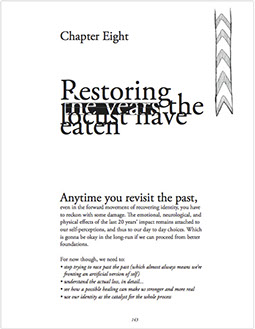YOU ARE
HERE
GOOD NEWS: You already know a lot about your own identity. BAD NEWS: Some of what you 'know' isn't necessarily you. There are some immutable things which you've known about yourself since childhood, and other things which you were 'called' your whole life, and stuck to you whether they were true of you or not. There are some things that you're interested in, but may not be (say, the difference between 'I like music' and, 'I am a musician'). There are other things which you've forgot, or compromised about yourself in the haze of growing up, going to school and getting any job you could. The results of all this being a partial knowledge of yourself, which partially inspires a sense of hope about your future while partially frustrating your present situation.
This section is about honestly articulating what you already know to be true, and, hopefully weeding out those things that aren't. From a clear sense of where you are today, we can build a broader identity platform (in the coming sections) and affirm all the work that's already gone into the forming of you. To encourage you along the way, I’d like to mention four crucial things about identity. First, identity is obvious if you pay attention. People naturally identify themselves in play, language, work, and relationships. Second, identity needs encouragement and facilitation. We’re all vulnerable and need people we trust to validate what’s forming inside us. Third, identity is massively diverse. Those synthesizing their gifts are often much more fulfilled than those drilling down in one area of life. Forth, identity takes time. Everyone develops at a different pace. Acknowledging this is essential for the more nuanced aspects of identity to unfold within context. With this in mind, let's see what you already know.
CASE STUDY:
Blue Bradley
When I (Blue) first moved into the city, I went to work for a good friend of mine who ran a high rise window cleaning business. I began what was supposed to be my six week training before we went ‘on rope’ for real. On the third day I was cleaning windows 14 stories up and loving it. The sun was shining, the views were amazing, and the work was really interesting. But on the fourth day something felt terribly wrong. The only way I can try to describe it was that it felt like I was going to a funeral. I thought it might just be a mental block that I had to push. Maybe I was just scared of the height I was working at. So later that morning, as
I was hanging off the side of the building about ten stories up, I asked myself a great question, ‘What of my top five Strengths am I using’? As I went through my five I realized something, four of my top five are what is called influencing themes. This means I use these themes to influence others around me. I’m a pioneer, I have to start new things with people. I instantly understood what was happening— while I was dangling off the side of a building all day (fun as it was) I didn’t have the chance to interact with lots of people. The by-product for me was that I felt disconnected which made me feel kinda numb. As soon as I realized this I went to my friend and explained why although the work was fun, it wasn’t a right fit, and I could not see myself doing this in the future.
I left that day and explored other working opportunities that had opportunities to interact and influence people everyday. I’m amazed how many people I come across who ‘work for the man’, so to speak, and hate what they do for a job. They started off excited like I did, but it soon grew stale because they didn’t have an opportunity to work in their areas of passion or Strengths. Find a fit you’ll be passionate about or keep looking, keep aligning your strengths to your choices.
To read Blue's ideas on building on your strengths, click here:
FAMILY SYSTEMS AND THE FORMING OF YOU
The principle:
I think our parents represent two distinct qualities which we observe and absorb as children. Our mothers (among other people) start us off by fostering our sense of security through modeling unconditional love and provision. This overall security gives us a platform to learn about ourselves and the world around us through play, language, and breaking things. Her unconditional love allows our identity to unfold unhindered by expectations. Her provision gives us the basic physical and emotional nourishment to develop our inner and outer lives. Our fathers (among other people) build on this by developing our sense of significance—by acknowledging our value and encouraging a sense of destiny. This sense of significance becomes the precursor to confidence and creativity. The specific value statements he instills solidify our growing knowledge of self, while the dreams he facilitates give a sense of opportunity or destiny. The thousands of mini-messages we receive from our parents (and others we trust) in these regards create a platform for living from the inside-out.
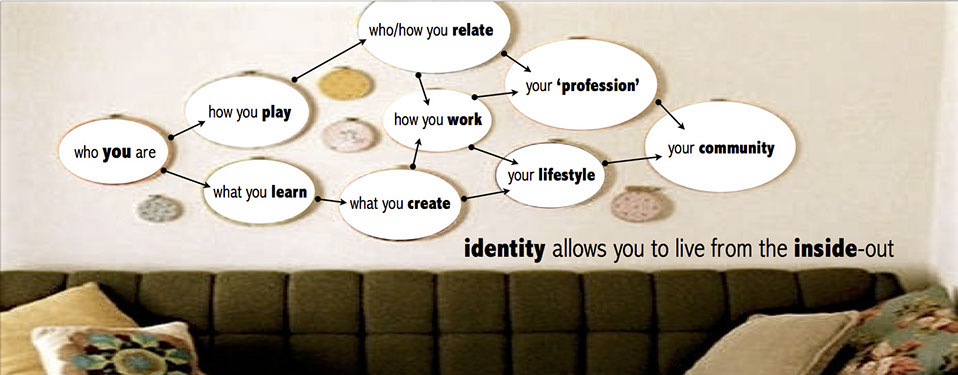
My reality:
I can sum up my identity development through 18 years at home in the following way: My mother: “You could be President”, and my father: “Get a job”. My mother didn’t tell me why I could be President and my father didn’t tell me which job may have suited my identity, but there you have it. I remember a lot of useless classes at school and even more useless peer pressure. Aside from my mom’s general encouragement, I didn’t learn much about myself at all during those years. I knew I liked certain kinds of music and that I liked to draw and write, none of which was really appreciated in school or fostered at home. For me, and I suspect many others, most of the things I thought about myself came from external expectations and social norms. I learned to live from the outside-in.
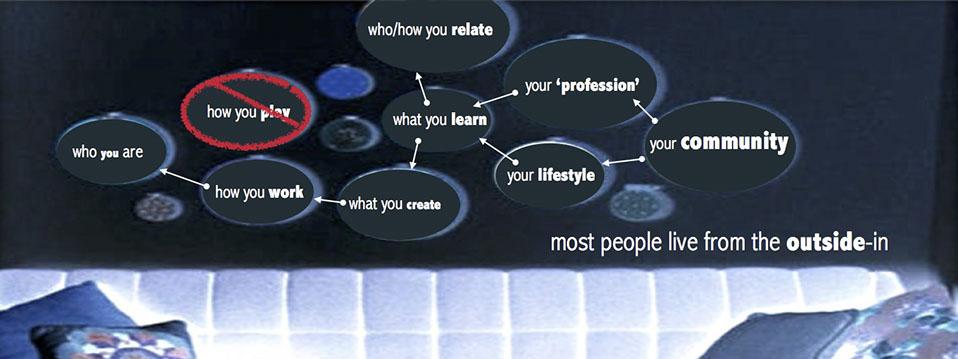
Nevertheless, if I look closely at where my imagination went, how I played, what drew my attention and those things I naturally did well at, there's a wealth of identity insights to be seen. Below are some more places to look...
RECAPTURING IDENTITY FROM YOUR YOUTH
I think it's worth examining what our lives told us before the often distracting voices of adulthood drowned out what we knew to be true of ourselves.
Lets start with some general impressions that you came away with from your upbringing? Think about the positive and negative names or words that may still define you. We need to see what’s true and build on it, and also, what may have become as a result of negative identity statements that are now holding you back. For instance, a positive word might be that you’re a highly relational person (a 'social butterfly'?), and so you’ve become just that... While a negative word might be that you were not smart enough to get into medicine (a 'dumb athlete'?), and so you place that same stigma against any new education options... Try and list a few of these basic life impressions, or ‘I am’ statements, that got attached to you over the years and place them in true and untrue columns in your journal. Here's some questions that may help develop the lists
Hard times: What are some identity statements formed in trauma or just the challenges of life that you think you’ve become, that aren’t really you? For me, this would be things like ‘I am controlling’ because I didn’t want my family to fail like my parents. Or ‘I am stupid’ because I could never do well in school. Now I know better, school is stupid:-)
Big wins: Write a quick story of a single success in your life. Something you felt you did really well, regardless of what others thought. After writing the story down, go back and try to see: A. What were the things that motivated you? B. What were the particulars involved in the achievement? C. What were you BEING in this success?
Three minutes of identity: Try to list as many things that are true about you as you can in three minutes. Use the term ‘I am...’ Just go for it without thinking too much about it. Your soul actually knows a lot when you don’t slow it down with self-image filters.
Environments: What places were you drawn to growing up and why? We’re you hanging out at the beach, or the library, or the place where the cool kids were smoking? What motivated you towards ‘third places’, or spaces outside of your home, and what did you want to do there? Try seeing those places as spaces for you to be your self. What were you being?
Strong impressions: Were there influential people in your life (teachers, friends, celebrities) that said something that inspired you? What was the inspiration and what do you think that says about identity? A lot of people got into science or tech because of Star Trek. Others found their own musical voice through the sounds of other musicians... What moved you growing up and why?
Dreams: What are some memorable dreams (daydreams or otherwise) that you can still recall? What were some motives behind the dream? Be careful to not judge yourself, just try to see what the dream says about who you were being in the dream.
Gathering it all together
On a separate page in your journal, list all of the true identity statements that you gathered from the questions above or other associations and stories that may have arisen from these questions. For instance, if I look at the third spaces that I was drawn to growing up (like sports fields, basketball courts, games on the streets of my neighborhood), then I would write identity statements like "I am collaborative, a supporter, intuitive, physical, intimate". The obvious things like being athletic or competitive give way to who I was actually being in those situations. The more nuanced and true you can be about yourself, the closer you get to matching those "I am" statements with meaningful decisions about what you'd like to do with your life. We'll look more at this later.
IDENTITY & FORMAL SYSTEMS
Learning from Myers-Briggs, Strengthfinders etc.
In asking my friends about their experiences with personality tests and other identity tools, I often hear that they were helpful in certain ways, BUT... The ‘but’ is usually followed with how ‘tools can’t define you’, or how limited they were in seeing diversity, or that they narrowed you to a static position etc. The same applies to this site—no single source can define the eternal part of you. I think that personality tests, and this site, functions best when you’re driving a broad process of discovery and application within community. True discovery happens when you explore the various angles of your diamond—using all the tools available—and the application is where you put that knowledge to work in a meaningful way (via relationships, life direction, your creativity).
So this section is dedicated to pulling the strengths out of your StrengthsFinder results. Or to build on your Myers-Briggs / Enneagram / IDAK / SIMA findings by learning to assess them in a life changing way, meaning you change your life for the better because of what you now know. This section is about assimilating, and then intentionally combining, these attributes / strengths / ‘I am’ statements together in such a way that you can see a much larger picture of yourself. Not a new you, but restored expressions of what you were born with.
Most of my friends gained a better appreciation of themselves knowing that they were ‘ENFP’s’ (Extroverted iNtuitive Feeling Perceiving on the Myers-Briggs spectrum) for instance, but that didn’t necessarily translate into a clearer sense of direction. Also, the all or nothing language of some systems doesn’t make room for a dynamic synthesis of other inputs out of which you could build a creative future. What people typically gained through typical algorithmic testing was a better day to day sense of self without perhaps all the self judgment. But to me, that’s just starting out. My hope is that you can get all kinds of inputs together and dream from the overview.
I've placed a series of links on the right to further explore some of the best or longest established personality tests. You may or may not be interested in them or may have already done some of these tests. What I'd like to do here is give you an opportunity to add what you've learned about yourself to the journal you're working. I'll offer some specific questions that may help reinterpret these algorithms into identity statements that you can create a larger map with later. For now, perhaps you could make a section in your journal for one or more of the following sections:
Click here to get an excellent overview of personality tests by Blue Bradley
Here's some useful inks to personality tests
For Myers Briggs personality tests:
http://www.16personalities.com/free-personality-test
http://www.truity.com/test/type-finder-research-edition
http://www.quora.com/What-is-the-most-accurate-free-online-Myers-Briggs-test
For Strengthfinders tests, you have to buy the book and they give you a code that links to their site to do the test.
http://www.amazon.com/StrengthsFinder-2-0-Tom-Rath/dp/159562015X
For the Enneagram:
http://similarminds.com/test.html
https://www.enneagraminstitute.com/rheti-sampler/
http://www.enneagramquiz.com/quiz.html
Have you done another assessment like SIMA, IDAK or SOI (Structure of Intelligence)? Take a few minutes to drag them out and have a read. After a bit of consideration, journal the important stuff that you’ve gleaned from the assessments, or perhaps add to them with other insights you’ve gained over the time since doing the test.
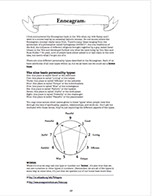
Identity & StrengthsFinder
1. Write down your top 5 strengths. Have you read the results and do you agree?
2. Can you articulate the general themes from your top 5 without using the terms? (E.g. can you tell someone about your strengths without using the jargon?)
3. Can you think of past or current stories where you have seen these strengths at work in your life? And do those stories unlock any other ‘I am’ statements?
4. From your understanding of your top 5, have you put a plan in place where you can use these more in your day to day situations? If not, got any ideas?
5. What steps can you take to add skills and knowledge to two of your strengths so that you can sharpen or hone them?
Identity &
Myers-Briggs
1. Based on your test results, what broad personality types are you most like on the spectrum?
2. If you've done further reading on your type, what more nuanced characteristics describe you. For instance, an ENFP may be characterized by being energetic and curious. 3. Have a look at 16 Personalities site and select your most likely personality type (assuming you've done the test). Then, go through the "Explore this type" on the left side of the site. In each section, note in your journal those descriptive identity statements that you empathize with the most. For instance: "As independents, sole proprietors in the parlance of business, INFJs are free to follow their hearts, applying their personal touch, creativity and altruism to everything they do."
Identity &
the Enneagram
1. Having researched the Enneagram, what would say your 'home base' type and your 'wing' is? Can you identify other terms that further describe these for you?
2. Have a look at the enneagram personality types here: www.enneagraminstitute.com and click on the type that is your home and wing. Please journal those words that are "I am" statements which you most identify with. For instance: "Type 5 - The Investigator, more than any other type, want to find out why things are the way they are. They want to understand how the world works, whether it is the cosmos, the microscopic world —or the inner world of their imaginations. They are always searching, asking questions, and delving into things in depth. They feel a strong need to test the truth of most assumptions for themselves."
PRELIMINARY 'IDENTITY MAP'
We'll cover this idea in depth in the next section of the site, but for now, have a go at taking a large sheet of paper, or two facing journal pages, and compiling all the identity statements you've written down from all the questions above. The idea is to get a bit of an overview so you can see:
• how diverse and complex your identity is
• that you're not just one thing, like a teacher or a mechanic
• possible groupings like your social identity, spiritual identity, creative identity etc.
• possible connections between identity statements which you could creatively combine into new relational or creative applications.
For instance: I could combine my 'I am a writer' with 'I am a designer' with 'I am a facilitator' to make an interactive web site to help people develop their own vocational guidance!
Here's an example from a friend:
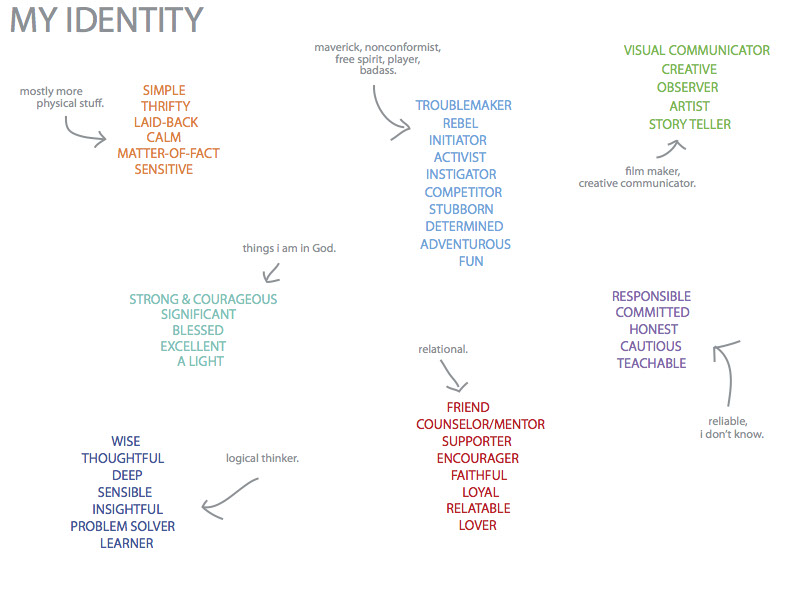
IDENTITY & RESTORATION
Anytime you revisit the past, even in the forward movement of recovering identity, you have to reckon with some damage. The emotional, neurological, and physical effects of decades of impact can remain attached to our self-perceptions, and thus to our day to day choices. Which is gonna be okay in the long-run if we can proceed from better foundations.
For now though, we may need to:
• stop trying to race past the past (which almost always means we’re fronting an artificial version of self)
• understand the actual loss, in detail...
• see how a possible healing can make us stronger and more real
• use our known identity as the catalyst for the whole process of further restoration
We've been focusing on what you already know about yourself and articulating that in a journal. What you may have run up against along the way is:
• being confused about what's true of you and what you aspire to but simply may not be as a person (interests v. identity)
• not being sure about what is truly you and what you've become to adapt to your situation or environment (nature v. nurture)
• wanting to find a way to look at your upbringing or development in a fresh way, or to even go back to those relationships and situations and retrace them with honesty, forgiveness. This may even mean asking people in your life to have another go at encouraging you with true identity statements which only they may really know about you.
This process of restoration is another journey in itself. I've found that as I pursue a deeper understanding of identity, I keep bumping into the things listed above. Sometimes the identity journey works out the kinks by itself, and other times, I've had to be more intentional about working through some issues from the past. If you think working through the restoration is an important part of your journey right now, you can start with this chapter of The Identity Project which I wrote for this very purpose. It may not solve everything but it would be a good platform to build on.
“The mainstream manufactures people as monoculture. It turns us out like cloned rows of apple trees on pesticide-manicured fields. The mainstream ‘trains’ people by pruning. It forces growth in standardized ways. The song that we sing from within the mainstream is thereby not our own song. It does not issue from the opened gates of the soul. And so our personal branches and cultural roots atrophy away. We yearn for connection with one another and with the soul. But we forget that, like the earthworm, we too are an organism of the soil. We too need grounding.”
- Alastair McInstosh
CHECKPOINT...
If you need to work on anything that’s come up during this entire process so far, please stop and take the time to do so. Get some runs on the board by building good foundations. You’ll need that platform to make the next two sections really worthwhile. I’m not saying everything in your life should be perfect before proceeding (as I’ve mentioned before, sometimes it’s the development of identity and doing the same with others that moves us out of the ruts we get into). But if there’s something really big you know you need to address, please do so.
Here's some checkpoint questions:
1. Have I already looked at identity through other means and been disappointed?
• What happened and what was the problem? Maybe you could go over that with a friend or coach and see what you can learn.
2. Do I have an idea of what I really want in life and do I know what my energy levels and motivations are?
• What needs to happen to re-energize you? Perhaps unfolding identity in the next section would encourage you, but you may also need to address, or at least understand, what’s happened to your energy and passion. In this way you can be aware of pitfalls, or traps where you may tend to give up your authority and lose motivation.
3. Niggling concerns about fear or failure?
• Sometimes the past has been mired by laziness or fear. In this case, it’s can be a matter of acknowledging that and putting in the hard work to understand ourselves better, and then applying that knowledge in a loving way. You can’t sit around having staring contests with fear hoping it’ll blink and go away. Instead, you walk towards your identity and act on your potential, gaining some confidence along the way.
• You can’t pay attention to the generational myth of financial security—there’s no such thing. Your parents were right that if you don’t work, you don’t eat, but security and having money are not the same thing. Security is founded on holistic living (spiritual, relational, and physical well being). Money follows the value you create, it’s that simple. So don’t worry about it, focus on creating value from your identity and you’ll be fine, or at least, you’ll be happy.
• If you’re wondering if you’ll ever be ‘good enough’ to do the things you really like, you’ll have to give it a couple hundred hours to see. You cannot know the difference between an interest and a true ability without this kind of effort. The only thing you need to know now is whether the efforts you’re about to spend on something is in line with your identity or not. So be bold and keep going.
